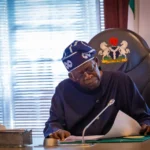
Last week I identified some notable African onomastic (onomastics is the science of personal names) influences among the Gullah people. This week I’ll highlight a few African lexical influences in the Gullah English dialect. But before I do that, I’d like to draw the reader’s attention to the fact that Clarence Thomas, the only black person in the US Supreme Court and the second black person to ever be appointed to the US Supreme Court after Thurgood Marshall, spoke Gullah as a child-and still speaks it whenever he so desires.
In 2000, according to the New York Times of December 14, 2000, he told a 16-year-old high school student that his remarkable reticence in the Supreme Court and elsewhere has roots that go back to his childhood. As a child, he said, he was taunted by his peers and teachers for speaking his Gullah English dialect (which he said was more popularly known as Geechee in Savanah, Georgia, where he grew up) or for allowing Gullah influences to creep into his standard spoken English.
“When I was 16, I was sitting as the only black kid in my class, and I had grown up speaking a kind of a dialect. It’s called Geechee. Some people call it Gullah now, and people praise it now,” he said. “But they used to make fun of us back then. It’s not standard English. When I transferred to an all-white school at your age, I was self-conscious, like we all are…. And the problem was that I would correct myself midsentence. I was trying to speak standard English. I was thinking in standard English but speaking another language. So I learned that – I just started developing the habit of listening…. I didn’t ask questions in college or law school. And I found that I could learn better just listening.”
Perhaps he meant to say he thought in Gullah and tried to translate his thoughts into Standard English and couldn’t help the episodic, involuntary intrusions of Gullah.
Michelle Obama is also said to be descended from Gullah ancestors on her paternal side, although neither she nor her parents speak, or ever spoke, Gullah because their forebears left the Sea Islands many generations ago. It was her great-great-grandfather, Jim Robinson, according to some accounts, who spoke Gullah.
I can’t possibly write about the hundreds of African words that have survived in the Gullah language when Dr. Lorenzo Turner recorded them in the 1930s and 1940s, so I list only a sample here.
1. “Agogo.” Many Yoruba speakers recognize this word as the name for a bell or a bell-shaped metal musical instrument in their language. In Gullah, it means a cowbell, that is, a bell hung around the neck of a cow to make finding it easy. In modern times agogo is also used in Yoruba and other languages, such as Baatonum, to mean a clock, which is decidedly a semantic extension that derives from the notion of a bell as a time marker.
2. “Amin.” Gullah people intersperse their supplications with “amin” instead of the English “amen.” Amin is, of course, the Arabic version of the Hebrew “amen,” which has been exported to and domesticated in English. It means “so be it” in both Hebrew and Arabic. The Gullah use the Arabic version of the word during their (Christian) prayers because that was the version passed on to them by their West African Muslim ancestors.
3. “Bakra.” This Gullah word for “white man” is derived from “mbakara,” the Annang/Efik/Ibibio word for white man. (Annang, Efik, and Ibibio are mutually intelligible dialects of the same language in Nigeria’s deep south.) Turner said Igbo people also use “mbakara” to mean “white man.” That’s not entirely accurate. The Igbo word for white man is “ocha,” but it is conceivable that because Igbo, Annang, Efik, and Ibibio people are geographic and cultural cousins, Igbos understood-and even used-mbakara to mean white people in the 1930s when Turner conducted research for his book. Interestingly, many black people in the Caribbean Islands also use some version of “mbakara”-such as buckra, bacra, and buckaroo-to refer to white people. In some Texas and California communities in the United States, buckaroo and bucheroo are also used to mean a “cowboy.”
4. “Be the groun.” This is an agricultural register in the Gullah dialect. It means to get the ground ready for farming, where “be” means “to clean, to remove debris.” Turner discovered that in Wolof, a Niger-Congo language spoken in Senegal, the Gambia, and parts of Mauritania, “bei” means to “cultivate, to prepare ground for planting.”
Because of the phonetic and orthographic similarities between the Wolof “bei,” which is rendered as “be” in Gullah, and the English “be,” the expression “be the groun” used to be thought of as an incompetent attempt to speak Standard English. Thanks to Turner, we now know that the expression has its own Wolof-inflected syntactic and sematic logic independent of Standard English.
5. “Bidibidi.” This means “small bird” or “small chicken” in Gullah. It is derived, according to Turner, from Kongo, a Niger-Congo language spoken in Angola (from where about 39 percent of Gullah people came, as I pointed out two weeks ago) and the Congo, where it also means small bird or small chicken. White linguists who studied Gullah had dismissed this word as “baby talk” for “small bird” because of the phonetic-and accidental semantic-affinities between “biddy” (the informal English word for small bird or fowl) and bidibidi.
6. “Da” or “dada.” In Gullah, “da” and “dada” are used interchangeably to mean “mother, nurse, an elderly woman.” Turner found parallels for these words in Ewe (spoken in Togo, Ghana, and Benin Republic) where “da” and “dada” mean mother or elder sister. Notice that in Igbo “ada” means “eldest daughter.”
7. “Done for fat.” Earlier researchers had thought this Gullah expression meant “excessively fat.” They thought the “done for” in the expression was an intensifier for “fat,” which they said merely suggested that the Gullah people meant fat people were “done for,” that is, doomed to die. But Lorenzo Turner’s painstaking research shows us that “done for” is actually the phonetic Anglicization of “danfa,” which is the Vai word for fat. Vai is a Niger-Congo language of the Mande branch spoken by a little over 100,000 people in what is now Liberia and Sierra Leone. So, basically, the Gullah people combined the Vai and the English words for the same condition- for emphasis. It should actually have been correctly written as “danfa fat.”
8. “Dede.” This means “correct, exact, exactly” in Gullah. Turner compared it with the Yoruba “dede” and the Hausa daidai (which he wrote as “deidei”), which also mean “correct, exact, exactly.” In Kongo, dedede also means “similarity, correspondence.” In my language, Baatonu, like in Yoruba, dede means “correct, exact, exactly.”
9. Fulfulde counting system. One of the discoveries that pleasantly shocked me is the realization that the Gullah people still retain several Fulani numerals in their English dialect. In Gullah (as in Fulfulde with only slight variations in accent and spelling), one is go, two is didi, five is je, six is jego, seven is jedidi, eight is jetati, nine is jenai, ten is sapo, eleven is sapo go, twelve is sapo didi, thirteen is sapo tati, fourteen is sapo nai, fifteen is sapo je, sixteen is sapo jego, seventeen is sapo jedidi, eighteen is sapo jetati, nineteen is sapo jenai, etc.
The Gullah people who shared this counting system with Turner in the 1930s had no clue from which African language they inherited this counting system. My sense is that it was passed down to them from some of their Senegambian Fulani ancestors. Note that I wrote these words exactly as Turner wrote them. When I searched online Fulfulde dictionaries, I found slight variations in the modern spellings of these numerals, but it’s remarkable, nonetheless, that the Fulfulde counting system has survived among the Gullah after more than 300 years of separation from its original source.
10. A reverse influence: In a chapter of my book, Glocal English: The Changing Face and Forms of Nigerian English in a Global World, I discussed the African heritage of common English words and expressions, which entered the language through so-called African American Vernacular English (AMVE). I pointed out that some expressions/words started out as African-derived Gullah dialectal expressions, made their way to demotic African-American speech, and then to global conversational English through what I called “pop-cultured-induced linguistic osmosis.” At other times, certain conventional colloquial (American English) expressions (such as “my bad,” “to bad-mouth someone,” “do your own thing,” etc.) began life as calque formations from West African languages in African-American English before mutating to mainstream English. This is also true of many everyday words like “tote,” “jitters,” “phony,” etc.
From reading Turner’s book, I’ve discovered African-derived English words like “yam” (from the Mandingo yam or yambi, the Ga (Ghana) yamu), tote (meaning to carry), etc. entered English by way of Gullah.
To be concluded next week
 Join Daily Trust WhatsApp Community For Quick Access To News and Happenings Around You.
Join Daily Trust WhatsApp Community For Quick Access To News and Happenings Around You.


